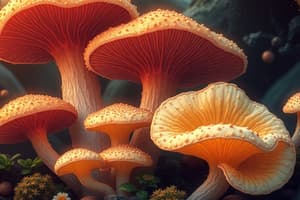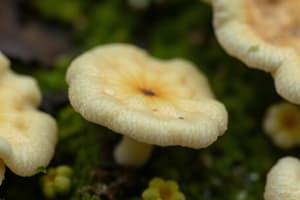Podcast
Questions and Answers
Which symptom is associated with oropharyngeal candidiasis?
Which symptom is associated with oropharyngeal candidiasis?
- Pain or discomfort when urinating
- Vaginal itching or soreness
- Blurry vision
- White, curd-like patches on the inner cheek (correct)
What is a common sign of vaginal candida?
What is a common sign of vaginal candida?
- Confusion
- Muscle ache
- Low blood pressure
- Pain during intercourse (correct)
Which of the following is a symptom of invasive candidiasis affecting the eyes?
Which of the following is a symptom of invasive candidiasis affecting the eyes?
- Cotton-like feeling in the mouth
- Chills and fever
- Vaginal itching
- Blurry vision (correct)
What underlying cause can lead to vaginal candidiasis?
What underlying cause can lead to vaginal candidiasis?
Which symptom is indicative of oropharyngeal candidiasis?
Which symptom is indicative of oropharyngeal candidiasis?
What is a characteristic feature of molds?
What is a characteristic feature of molds?
Which of the following statements about yeasts is true?
Which of the following statements about yeasts is true?
Which fungal species is a common cause of candidiasis?
Which fungal species is a common cause of candidiasis?
How can fungal infections be classified?
How can fungal infections be classified?
What is the primary nature of most fungal infections?
What is the primary nature of most fungal infections?
What is the more commonly known name for Tinea pedis?
What is the more commonly known name for Tinea pedis?
Which of the following is NOT a sign or symptom of ringworm?
Which of the following is NOT a sign or symptom of ringworm?
What is the primary method of diagnosing ringworm?
What is the primary method of diagnosing ringworm?
Which treatment is recommended for ringworm on the scalp?
Which treatment is recommended for ringworm on the scalp?
How can ringworm infections be transmitted?
How can ringworm infections be transmitted?
What condition is referred to as Tinea corporis?
What condition is referred to as Tinea corporis?
Which of the following is an incorrect treatment for ringworm?
Which of the following is an incorrect treatment for ringworm?
Which area of the body does Tinea barbae infect?
Which area of the body does Tinea barbae infect?
Flashcards
Fungal Infections
Fungal Infections
Infections caused by fungi, often opportunistic.
Ringworm
Ringworm
A common fungal skin infection caused by fungi like Trichophyton, Microsporum, and Epidermophyton.
Candida Infections
Candida Infections
Fungal infections caused by the Candida albicans yeast.
Fungi Types
Fungi Types
Signup and view all the flashcards
Molds
Molds
Signup and view all the flashcards
What is Candidiasis?
What is Candidiasis?
Signup and view all the flashcards
Oropharyngeal Candidiasis
Oropharyngeal Candidiasis
Signup and view all the flashcards
Vaginal Candida
Vaginal Candida
Signup and view all the flashcards
Invasive Candidiasis
Invasive Candidiasis
Signup and view all the flashcards
Causes of Vaginal Candida
Causes of Vaginal Candida
Signup and view all the flashcards
What is ringworm?
What is ringworm?
Signup and view all the flashcards
Tinea cruris
Tinea cruris
Signup and view all the flashcards
Tinea corporis
Tinea corporis
Signup and view all the flashcards
Tinea pedis
Tinea pedis
Signup and view all the flashcards
Tinea capitis
Tinea capitis
Signup and view all the flashcards
Ringworm Signs
Ringworm Signs
Signup and view all the flashcards
Ringworm Transmission
Ringworm Transmission
Signup and view all the flashcards
Ringworm Diagnosis
Ringworm Diagnosis
Signup and view all the flashcards
Study Notes
Fungi Overview
- Fungi are common in the environment, and people encounter fungal spores daily.
- Fungal infections are often opportunistic.
- Fungi are categorized by their life cycles, fruiting body structures, and spore types.
- Common types include molds, yeasts, and mushrooms.
Molds
- Molds have a thread-like structure called hyphae
- A network of hyphae is called a mycelium.
- Molds reproduce through spores.
- They thrive in warm and moist environments.
- Examples include mold on bread.
Yeasts
- Yeasts are single-celled fungi.
- They reproduce through budding and can sometimes form pseudo-hyphae.
- Yeasts cannot produce spores.
- They can thrive in a diverse range of environments.
- Examples include yeast used in baking.
Fungal Infections: Ringworm
- Ringworm is a common fungal infection affecting various parts of the body.
- It is caused by Trichophyton, Microsporum, and Epidermophyton.
- It is classified by location:
- Groin/inner thighs/butt (Tinea cruris)
- Torso/arms/legs (Tinea corporis)
- Feet (Tinea pedis)
- Scalp (Tinea capitis)
- Hands (Tinea manuum)
- Beard (Tinea barbae)
- Fingernails/toenails (Tinea unguium)
Ringworm: Signs and Symptoms
- Itchy skin
- Ring-shaped rash
- Red, scaly, cracked skin
- Hair loss in affected areas
- Peeling between toes/fingers or blisters on soles/palms
- Discolored, thickened, or peeling nails; soft, dry, and powdery nail surfaces
Ringworm: Transmission
- Direct contact with the rash of an infected person.
- Indirect contact through contaminated items (fomites).
- Transferring infection from affected areas by scratching uninfected areas.
Ringworm: Diagnosis
- Physical examination
- Potassium hydroxide (KOH) stain
- Fungal culture
- Polymerase chain reaction (PCR) test
Ringworm: Treatment
- Over-the-counter antifungal creams or powders (2-4 weeks).
- Prescription antifungal medications (1-3 months for scalp).
Fungal Infections: Candidiasis
- Candidiasis is an opportunistic fungal infection caused by Candida species.
- Candida normally resides on the skin and inside the body (mouth, gut, vagina).
Candidiasis: Classifications
- Vaginal Candida (Yeast infection)
- Oropharyngeal candidiasis
- Candida esophagitis (throat)
- Invasive candidiasis
Candidiasis: Signs and Symptoms
- Oropharyngeal/esophageal: White, curd-like patches in the mouth and throat, cracking or redness in corners of mouth, pain when chewing or swallowing, cotton-like feeling in the mouth, redness or soreness, loss of taste.
- Vaginal: White, curd-like discharge, itching or soreness, pain during intercourse, pain/discomfort when urinating, redness, swelling/cracks around vaginal wall
- Invasive: Stomach pain, chills, fever, low blood pressure, muscle aches, skin rash, fatigue, blurry vision, sensitivity to light, confusion, headache, memory loss.
Candidiasis: Causes
- Vaginal: Imbalance in normal vaginal flora, use of contraceptive devices(IUD, sponge, diaphragms), weakened immune system, diabetes.
- Oropharyngeal/esophageal: Antibiotics, dentures, smoking/dry mouth, diabetes, steroid medication.
- Invasive: Medical devices (carrying Candida from skin to blood), medical devices infected by healthcare worker's hands.
- Other/General: Oral intercourse with infected partner, breastfeeding.
Candidiasis: Diagnosis
- Physical examination
- Microscopic examination of vaginal discharge
- Fungal culture
- Endoscopy (for esophageal candidiasis)
Candidiasis: Treatment
- Antifungal medication taken orally or applied directly to affected areas.
- Antifungal medicine taken through an IV (Invasive cases).
Studying That Suits You
Use AI to generate personalized quizzes and flashcards to suit your learning preferences.




